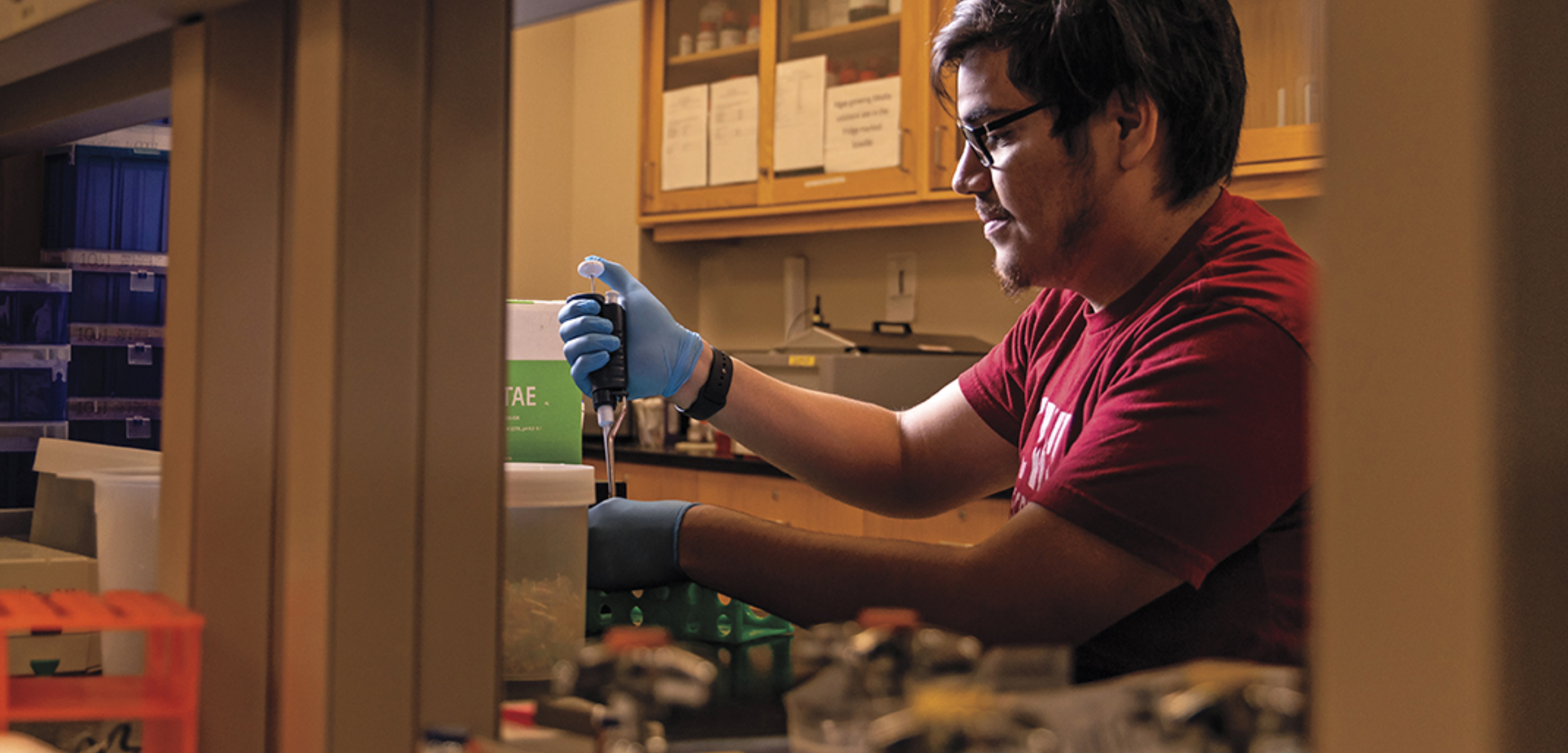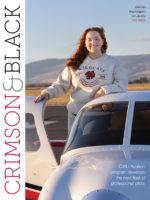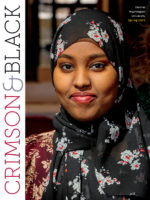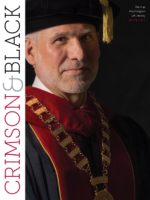
When Ricardo Mercado started his internship at Fred Hutchinson Cancer Research Center in June, he wasn’t sure he fit in.
The first-generation college student and son of migrant farmworkers questioned whether he deserved his place in the prestigious Summer Undergraduate Research Program (SURP).
“I struggled with wondering, ‘Do I really belong here?’” said Mercado, who grew up in Yakima. “Some of the other interns already had research opportunities in prestigious schools, and I look at them and say, ‘Do I fit in? Is this where I belong?’”
His sense of being an imposter was heightened by the fact that his family, at first, didn’t support his pursuit of biology as a career choice. When he told his parents he was planning to major in
molecular and cell biology at Central, rather than pursue a more cut-and-dried career in health
care or a technical field, they weren’t exactly thrilled.
“My dad kind of stormed off and told me I was going to ruin my life,” said Mercado, who will graduate in the spring.
Mercado’s experience isn’t uncommon among the first-gen community, particularly those from underrepresented or low-income families. That sense of insecurity—referred to as “imposter syndrome”—can interrupt academic success and leave students questioning whether they deserve their spot.
While imposter syndrome is not unique to first-generation students, these feelings can often hit them harder. For first-gens in science, technology, engineering, and math (STEM) fields, that insecurity can be even more pronounced.
“It’s one of those nefarious phenomena that creeps up on people when they least expect it,” said Dr. Pamela Nevar, director of the McNair Scholars program. “It’s like this shadow that recedes and comes back to haunt them every once in a while. Particularly because they come from backgrounds where their family members haven’t earned degrees, so they don’t necessarily feel like they deserve one.”
••••••
Bucking Expectations
Nevar is familiar with hesitant or even negative reactions from the parents of first-generation students. Migrant families and others from communal cultures expect children to stay close to home, help pay the bills, and care for siblings and older relatives. Mercado knew his parents expected him to study a discipline that might lead to a more traditional career path.
“They really pushed me more toward health care careers, and I was down that route for a little while,” he said, adding that he started his college journey in the high school-based Running Start program before transferring to Yakima Valley College upon graduation. “I decided to apply for a research opportunity at YVC and I got my first taste of what it’s like to work in a lab.”
Just like that, a passion was born.
At CWU, Mercado applied to the McNair Scholars program, which prepares first-generation students from low-income backgrounds and students underrepresented in graduate education to pursue research experience and advanced degrees. Mercado also earned a spot working in the laboratory under Biological Sciences Professor Dr. Lucinda Carnell.
Despite his academic successes and his family’s growing acceptance, Mercado still wrestles with the question of whether he belongs.
“When I first started working with Dr. Carnell, I had these thoughts of ‘What is so special about me for her to take me into her lab and give me this space to learn?’” he said.
That work helped him land a spot in the SURP at Fred Hutch, a nine-week internship program open to select undergraduates interested in pursuing biomedical research. Mercado’s project last summer involved studying the role of MITF, a protein that has been associated with tumor survival in melanoma.
As his love for research has grown, Mercado’s parents have started to come around on his educational path.
“My parents are able to see that this is something I really enjoy, and they started to be more accepting of it, even though they don’t fully understand what I do,” he said.
••••••
Additional Obstacles
Statistics show first-generation students are also more likely to come from underrepresented backgrounds and a lower socioeconomic status, making higher education feel unattainable to them, Nevar noted.
“These students often don’t see people in positions of power, influence, and authority who look like them,” she said. “They know what it’s like to come from a background where no one has a bachelor’s degree. So, to be thinking about a graduate degree is a real change for them psychologically. They step onto a graduate campus and it feels like ‘This isn’t real. I don’t fit in. I don’t come from this background.’”
The McNair program is designed to help the students overcome that feeling and own their place in academia. McNair Scholars are high-achieving juniors and seniors, and the program preps them on what to expect in graduate school, how to navigate applications and funding, and arrange campus visits. They meet with graduate students and faculty and get to practice presenting research at conferences like the Symposium of University Research and Creative Expression (SOURCE).
“We want them to see that there are many people who are out there doing this type of work, so they realize, ‘I can do this, too.’ It helps them to see graduate school as not so strange and foreboding,” Nevar said.
••••••
Building a Network
Nevar sees many first-generation students like Mercado who are pursuing education despite family objections and cultural norms. Some try to do both—taking care of siblings and parents, working to provide for their family, and even raising their own children—while pursuing a degree.
“They have financial challenges, family challenges. They’re often thinking to themselves, ‘I have so much else to take care of, why am I even looking at graduate school? I should be getting a job,’” she said. “We try to get them to shift that mindset and realize that grad school is a job. It’s a good job—one that can help them become changemakers in their communities and for their families.”
Essential to their success is a strong support network that includes McNair and the other TRIO programs, Upward Bound and Student Support Services.
“The TRIO programs are designed as a very natural flow,” Nevar said. “Upward Bound works with high-schoolers to bring them into college, SSS works with them as undergraduates, then McNair prepares them for graduate school.”
A supportive network of faculty and staff proved to be crucial for Mercado when his family questioned his path.
“I had amazing instructors at YVC who supported me,” he said. “Even when I didn’t have my parents (behind me), I had the support of my instructors. My advisors helped me and pushed me along. They helped me with more than just academics; they were a family.”
On days when Mercado feels like he doesn’t fit in to his new world, that network becomes a source of strength for him.
“I feel like I owe something to my instructors who believed in me even before I believed in myself. They saw something special in me,” he said. “Even though I may feel like I don’t belong, deep down other people think I do. I have these people sitting in my corner, cheering me on.”
And he’ll never forget that support. On his first day at his Fred Hutch internship, Mercado wore the face mask he was given during his very first research experience at YVC.
When his principal investigator asked him why he was wearing it, his answer was simple: “It’s just to remind me of where I came from.”






comments powered by Disqus